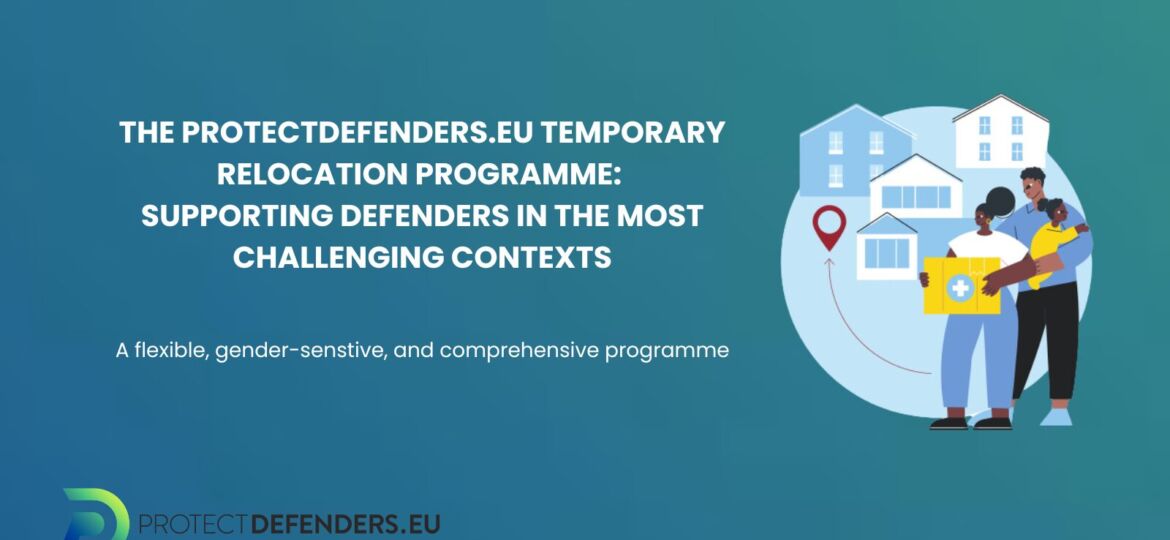
Since its launch in 2015, the EU HRD mechanism – ProtectDefenders.eu has been at the forefront of safeguarding human rights defenders (HRDs), supporting over 80,000 individuals worldwide who face increasingly hostile environments. In recent years, the Consortium of organizations implementing the EU HRD mechanism has observed a rise in judicial harassment, repression, defamation, surveillance, and killings targeting HRDs for their commitment to peaceful advocacy and human rights. The crises in regions such as Palestine, Ukraine, Afghanistan, Sudan, and Myanmar have intensified these challenges, making relocation a critical necessity for many HRDs to mitigate risks and ensure their safety.
By providing financial support to a host organisation responsible for implementing the relocation, ProtectDefenders.eu Temporary Relocation (TR) Programme seeks to address this rising need and enable relocated defenders to rest and respite, enhance their empowerment and advocacy network, while continuing their human rights work in a safe space.
An Effective and Comprehensive Programme
In the last two years, the Consortium approved relocation initiatives that benefited at least 123 individuals, the large majority of which were from critical countries recognized by the Mechanism as priority for attention. Furthermore, between 2022 and October 2023, 57% of the total temporary relocation grants included family members of HRDs, resulting in a total of 111 family members supported under the programme. This support demonstrates the comprehensive and gender-sensitive strategy of the Mechanism and its responsiveness to the psychosocial needs, integrity, and empowerment of HRDs. Despite the challenges encountered – such as restrictions on international mobility, unfavorable visa frameworks, and the worsening conditions for defenders’ work and return, the programme has proven pivotal in the general objective of the Mechanism to support the work of human rights defenders and the promotion of human rights in the world.
Exemplary of the programme’s effectiveness is the case of a human rights lawyer from Central Africa relocated to France, whose identity remains confidential. The support of the TR programme resulted in a better quality of life and security not only for the defender, but also for his family and colleagues. An initial TR grant covered the expenses of an eye surgery that prevented the defender from going blind and allowed him to continue a normal life and his human rights work. Furthermore, the grant covered family support, granting the defender’s family and colleagues a monthly stipend while he was in relocation. Finally, following his relocation to DRC,an extension was granted to secure him a new office. Following the relocation process, the defender was able to return to his home country and his human rights work in a more secure and equipped way. Most of this, as reported by the defender himself, was largely possible thanks to the flexible and comprehensive support provided by the programme.
Challenges in Relocation: Before, During and After
There are several external challenges that can hinder the possibility for defenders to access relocation. For example, there are persistent barriers that prevent defenders from accessing EU visas when they are most needed. To address this issue, ProtectDefenders.eu has been actively involved in advocating for a more enabling visa framework for human rights defenders at the European level, through its “Visa for Defenders” initiative. This collective advocacy initiative – articulated around a joint position paper endorsed by more than 70 civil society organizations, largely contributed to the revision of the EU Visa Handbook in June 2024, which now includes detailed guidelines on accommodating the specific needs of human rights defenders within the existing provisions of the EU Visa Code. If followed, this revision may largely ease the processing of visas for HRDs in need and ensure their safety. A proper and thorough implementation of the new provisions in this handbook will be crucial for ensuring that the changes and updates in the instruments effectively translate into tangible improvements in visa conditions and the protection of at-risk defenders, while continuing efforts at all levels for deeper and more ambitious changes that recognize the comprehensive mobility and protection needs of HRDs.
Even when defenders are relocated in a different country, threats may continue in the form of Transnational Repression (TNR). States and non-states actors are increasingly reaching out their borders to suppress and stifle dissent. This may largely affect the psycho-social well being of relocated defenders and the efficacy of relocation as a safety net from the threats they were facing in the home country. In general, the worsening of repression worldwide and closure of civic space in more and more countries previously considered safe, is making the return to one’s own country after the relocation period more and more difficult for an increased number of defenders.
Resilience in the Face of Adversities
Despite these obstacles, the Temporary Relocation Programme remains a vital lifeline for HRDs, adapting its implementation strategies to meet growing demands, standing as a testament to the power of collective action in addressing the pressing needs of human rights defenders worldwide. By offering comprehensive, flexible, and targeted support, the programme not only ensures the safety and well-being of HRDs and their families but also empowers them to continue their essential work in advocating for justice and human rights. While significant challenges remain—such as restrictive visa policies, transnational repression, and the increasing closure of civic spaces—the ongoing commitment of ProtectDefenders.eu and its partners demonstrates the resilience and adaptability required to navigate these obstacles. The programme’s impact highlights the importance of sustained efforts to protect those who defend human rights, ensuring their voices are not silenced and their missions endure in the face of adversity.


